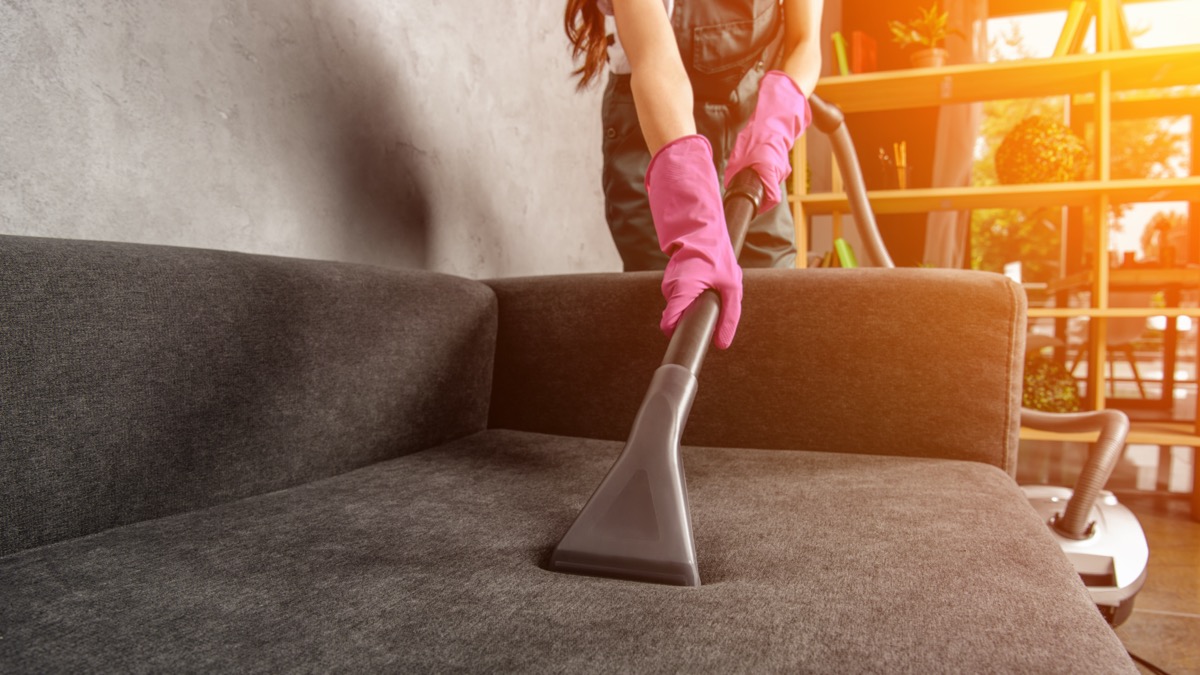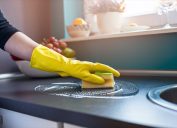The Filthiest Spot in Your Home Is 12 Times Dirtier Than a Toilet Seat
Research shows that most people may not be cleaning this household item as often as needed.

Many people pride themselves on keeping a clean household. But even the most careful of cleaners may not know that they're leaving some pretty grimy spots out of their typical household cleaning routine. According to research, most people have a couch that is dirtier than they realize. In fact, this filthy spot in your home is actually dirtier than a toilet seat. Read on to find out more about this neglected piece of furniture, and for more spots that could use your attention, check out these Things in Your Home You Didn't Realize You Should Be Cleaning.
A 2013 study, conducted by UNICEF and the cleaning brand Domestos, discovered that the average family sofa had 12 times the amount of bacteria than a typical toilet seat does.
"Depending on how we use the couch; it can take a lot of abuse," says James Conner, vice president of operations at Molly Maid, a Neighborly cleaning company. "From eating dinner in the family room or watching a movie with Fido snuggled up against you, the couch can capture more body oils, cooking odors, and airborne dust and dirt than you care to imagine."

But the bad news doesn't end there. Can you recall the last time you actually cleaned your couch? If you can't, you're not alone. It turns out most people aren't cleaning their couches nearly as often as they should be.
A 2020 European survey commissioned by Lottoland found that out of 2,000 British adults, 21 percent said it had been at least a year since they had last cleaned their couch. And 12 percent admitted that they had never cleaned their couch once. This is despite researchers finding that the average person sits on their couch for at least 16 hours a week.
"Often, people only clean up their couches because they can recognize noticeable stains," explains Greg Goldstein, president of Daimer Industries, a cleaning equipment company. "The dust, dirt, and bacteria can easily go unnoticed and people tend to forego the idea of cleaning the entire couch."
RELATED: For more up-to-date information, sign up for our daily newsletter.
One of the biggest problems is that most people don't know how to clean their couch. Trusted Safe founder Kevin Godfrey, a cleaning expert who writes cleaning protocols, says, "The main reason people don't clean their couch is that they don't have access to the proper tools or products." Instead, they rely on spraying something like Febreze on their couch, which only "acts as a mask rather than a disinfectant," he says.
According to Goldstein, cleaning your couch doesn't always have to be a hard or confusing job, however. You just have to know where to start when it comes to "regularly sanitizing and vacuuming" your couch.
"Vacuuming your couch can remove crumbs, hair, and fur," he says. "However, hiring an upholstery cleaner or using a quality steam cleaner is also recommended. A quality steam cleaner is effective in killing dust mites and bacteria, and helping lift stains."
Goldstein says this deep sanitizing process can be done around one to two times a year for most households, but if you have pets and kids, you may want to consider sanitizing every three to four months. And for more things you need to clean immediately, discover The One Thing in Your Home You're Not Cleaning That's Making You Sick.





















